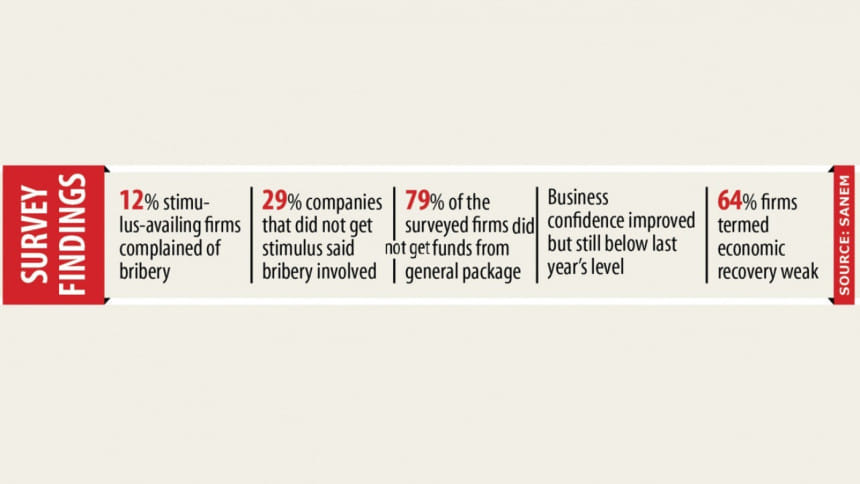Stimulus seekers complain of bribery

With the government implementing some Tk 1,28,000 crore-worth of stimulus packages to rescue firms from Covid-19-induced losses, complaints have begun to surface of bribes being demanded by employees of banks and various public agencies tasked with disbursing the funds.

A latest survey by the South Asian Network on Economic Modeling (Sanem) among 501 firms in manufacturing and services sectors recorded an increase in the number of complaints involving bribery over availing the low-cost stimulus loans.
Sanem said its April 2021 study found six per cent of firms that had availed loans from stimulus funds complaining of being asked for bribes. The latest study conducted in July by the same organisation showed that 12 per cent of firms which were able to get the stimulus support disclosed being asked for bribes.
Allegations over bribes came even from firms that did not avail the stimulus.
Some seven per cent of the firms surveyed in April 2021 alleged that bribes were intertwined with the process for getting funds from the stimulus packages. The allegation rose more than fourfold to 29 per cent in the latest survey by Sanem.
As there is a culture of corruption in society, it appears that some are trying to get undue benefit out of the huge demand for loans from the stimulus funds, said Sanem Executive Director Selim Raihan.
In its latest survey released yesterday, Sanem said 79 per cent of the firms surveyed had not yet received any fund from the stimulus packages. Entrepreneurs who did avail loans continued to complain about lengthy procedures and difficulties in bank related services.
There is a dearth of monitoring and transparency in the process for disbursement of stimulus packages, he said while sharing the findings of the survey on "Covid-19 and Business Confidence in Bangladesh" at a media briefing.
Sanem said effective implementation of the stimulus packages was critical.
"An assessment is urgently required on the stimulus packages implemented so far. Stimulus packages need to be redesigned and expanded amid the current wave of Covid-19," said Raihan.
Sanem said businesses were more confident about recovery in the current July-September 2021 period than what they had felt in the preceding quarter owing to relaxation of the countrywide lockdown.
It said the business confidence index (BCI), measured on a scale of 0 to 100, improved to 49.74 in the July-September period of this year from 41.39 in the April-June period.
"The improvement is visible for all of the sub-components. This improvement in business confidence gives hope over the revival of the private sector," said Raihan.
Sanem said confidence levels regarding recovery were higher in food, restaurant, garments, textile, leather and pharmaceutical sectors than that in transport, light engineering, wholesale, retail, real estate and ICT sectors.
This was the fifth round of the survey, being conducted by the research organisation since July 2020 to track the situation of the economy and sentiment of businesses.
Sanem said the fourth round of the survey in April this year exposed a deterioration of business confidence followed by the second wave of Covid-19.
"This round of survey provides insights on the pulse of the economy as the economy transits through the second wave of the pandemic," it said.
Despite making improvements from the previous quarter, overall confidence among business is still below that of the July-September period of 2020, when the BCI was 51.06, which indicates that the recovery process for the economy was going slow.
"The recovery process has been disrupted and there is still uncertainty," said Raihan.
Sanem said 64 per cent of respondents termed the economy's recovery weak while 27 per cent considered it moderate, and only 9 per cent opined that the economy had been on the path towards a strong recovery.
Remittance inflow, export of goods and services, banks' credit to the private sector and vaccination programmes, among others, are the major factors that are contributing to the overall economic recovery, said the research organisation.
Sanem said over the past 15 months, there had been some visible recoveries in business activities. However, business activities deteriorated in the April-June 2021 quarter compared to that in the January-March 2021 quarter.
"It is alarming," said Sanem, adding that the situation was worse for micro, small and medium, non-exporting and service sector firms alongside those located outside Dhaka.
"It shows the firms have fallen back again, and it might take longer to get back to the pre-pandemic situation," said the organisation.
The research organisation found that 67 per cent of the firms had been running by spending their savings as they had not received stimulus funds while some 20 per cent laid off employees to survive.
Some of the firms cut wages and salaries of employees to keep business afloat, said Raihan.
Regarding vaccination, the survey found some 60 per cent of respondents having received the jab.
It is a concern for the economy that the remaining 40 per cent has not been vaccinated yet, said Raihan.
Some 50 per cent the surveyed owners of micro firms had been vaccinated, he said.
The survey found that only 25.5 per cent of employees of the surveyed firms had been vaccinated.
Some 75 per cent of employees were yet to come under the vaccination programme, which is also another major concern for business and economic recovery.
Most of the vaccination took place among Dhaka-based firm owners and export-oriented firm owners account for the highest percentage of those vaccinated, as per the survey.
Haphazard, unplanned and ineffective lockdowns are rather painful for the country. On one hand the firms are having to stay shut while on the other the lockdown has no effective outcomes.
So, area specific lockdowns are required in the future through the formulation of protocols, recommended Raihan.

 For all latest news, follow The Daily Star's Google News channel.
For all latest news, follow The Daily Star's Google News channel. 



Comments